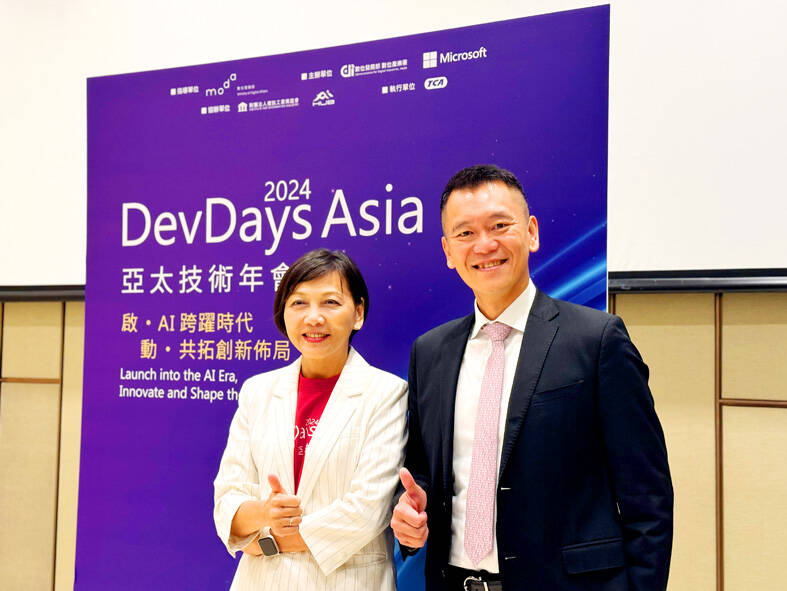DevDays Asia 2024, the largest software developer event in Asia organized by Microsoft Taiwan and guided by the Ministry of Digital Affairs, opened yesterday at the Hua Nan Commercial Bank Convention Center in Taipei and is to run until tomorrow.
The three-day event brings together developers, decisionmakers and industry experts in an effort to unlock the potential of artificial intelligence (AI), Microsoft Taiwan said.
During the opening ceremony, Minister of Digital Affairs Huang Yen-nun (黃彥男) said that Microsoft’s data centers in Taiwan have already started providing services.

Photo: CNA
The ministry has secured tens of billions of New Taiwan dollars from the National Development Fund to invest in the development of an AI ecosystem, including talent cultivation, Huang said.
It hopes to cooperate with major international companies like Microsoft to bring new tools and help Taiwanese companies develop international markets, he said.
AI and generative AI are reshaping business and people’s lives, and are poised to create opportunities through the digital economy, Huang said, adding that he hoped participants at the event can brainstorm more new ideas for such business opportunities.
Microsoft’s data centers assist clients in achieving more accomplishments by offering the best solutions, Microsoft Taiwan chief operating officer Flora Chen (陳慧蓉) said, declining to reveal details on their operations or the identity of its clients amid privacy concerns.
Since Microsoft announced its data center plans in Taiwan in 2021, its progress has attracted much attention. In June, the Taoyuan City Government announced that Microsoft would build two large data centers in the special municipality, with one in Gueishan District (龜山) scheduled to go online soon.
Microsoft Taiwan general manager Sien Pien (卞志祥) declined to reveal details about the Gueishan center, but said the data centers have begun providing services to some industries where data are highly regulated.
Now in its ninth year in Taipei and its third edition in southern Taiwan, DevDays Asia this year brings together 2,000 people, with the latest AI technologies in focus.
A separate one-day event is to be held in Kaohsiung on Friday.

Intel Corp chief executive officer Lip-Bu Tan (陳立武) is expected to meet with Taiwanese suppliers next month in conjunction with the opening of the Computex Taipei trade show, supply chain sources said on Monday. The visit, the first for Tan to Taiwan since assuming his new post last month, would be aimed at enhancing Intel’s ties with suppliers in Taiwan as he attempts to help turn around the struggling US chipmaker, the sources said. Tan is to hold a banquet to celebrate Intel’s 40-year presence in Taiwan before Computex opens on May 20 and invite dozens of Taiwanese suppliers to exchange views

Application-specific integrated circuit designer Faraday Technology Corp (智原) yesterday said that although revenue this quarter would decline 30 percent from last quarter, it retained its full-year forecast of revenue growth of 100 percent. The company attributed the quarterly drop to a slowdown in customers’ production of chips using Faraday’s advanced packaging technology. The company is still confident about its revenue growth this year, given its strong “design-win” — or the projects it won to help customers design their chips, Faraday president Steve Wang (王國雍) told an online earnings conference. “The design-win this year is better than we expected. We believe we will win

Chizuko Kimura has become the first female sushi chef in the world to win a Michelin star, fulfilling a promise she made to her dying husband to continue his legacy. The 54-year-old Japanese chef regained the Michelin star her late husband, Shunei Kimura, won three years ago for their Sushi Shunei restaurant in Paris. For Shunei Kimura, the star was a dream come true. However, the joy was short-lived. He died from cancer just three months later in June 2022. He was 65. The following year, the restaurant in the heart of Montmartre lost its star rating. Chizuko Kimura insisted that the new star is still down

While China’s leaders use their economic and political might to fight US President Donald Trump’s trade war “to the end,” its army of social media soldiers are embarking on a more humorous campaign online. Trump’s tariff blitz has seen Washington and Beijing impose eye-watering duties on imports from the other, fanning a standoff between the economic superpowers that has sparked global recession fears and sent markets into a tailspin. Trump says his policy is a response to years of being “ripped off” by other countries and aims to bring manufacturing to the US, forcing companies to employ US workers. However, China’s online warriors